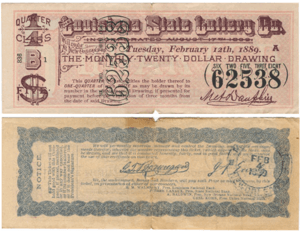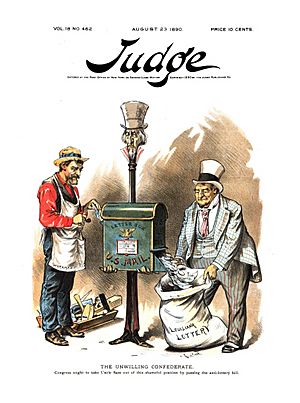Louisiana State Lottery Company facts for kids
The Louisiana State Lottery Company was a private business that ran the state lottery in Louisiana during the mid-1800s. For some time, it was the only legal lottery in the United States. However, it gained a very bad reputation. Many people thought it was a dishonest scheme that cheated the state and its citizens. It was also known for unfair dealings in politics.
How the Lottery Started
The company began as a group of business people from New York. They received a special permission, called a charter, from the Louisiana General Assembly on August 11, 1868. This charter allowed them to operate for 25 years. In return, the company agreed to pay the state $40,000 each year. Once this charter was approved, all other forms of organized gambling became illegal.
This deal quickly made the company seem suspicious. Many believed the company had offered money to lawmakers to get this special agreement. This happened at a time when other states were already wary of lotteries and gambling. The company was started by John Albert Morris and Charles T. Howard. John A. Morris owned most of the company, and Charles T. Howard was its official leader.
Charles Howard was the first president. He had worked for other lotteries before. Two former generals from the Confederate States of America, P. G. T. Beauregard and Jubal Early, helped with the lottery drawings. Their involvement made the lottery seem more trustworthy. However, the New York Times reported that they were paid a lot of money for only a few days of work each month. Most lottery tickets were sent by special train to agents across the U.S. and in other countries. These agents then sold the tickets in their areas.
In 1890, just three years before its charter was set to end, the company tried to make a new deal. They offered to give the state $500,000 every year. In exchange, they wanted their lottery to be written into Louisiana's constitution. This would have made it much harder to stop the lottery. For this to happen, a large majority of both parts of the Louisiana State Legislature and a public vote were needed.
Fighting the Lottery and Its End
People had always opposed the lottery because they felt it was wrong. But when the company tried to renew its charter and change the constitution, a strong, organized effort began to stop it. The Anti-Lottery League and its newspaper, the "New Delta", were the main groups fighting against the lottery. Many important activists, like Anthony Comstock, supported the League. Edward Douglass White also argued against the lottery in the Louisiana Supreme Court.
A well-known minister, Benjamin M. Palmer, gave a powerful speech against the lottery on June 25, 1891. This speech was at one of the League's biggest meetings in New Orleans. Many people believed this speech was the final blow that led to the lottery's downfall.
The Louisiana State Lottery became very famous, but for the wrong reasons. It was called the "Golden Octopus" because it seemed to reach into every American home using the U.S. Postal Service. In 1890, the United States Congress passed a law. This law banned the sending of lottery tickets and advertisements between states. This ban was a huge problem for the company, as 90% of its money came from these sales. The Supreme Court of the United States agreed with this law in 1892.
In March of that year, the plan to change the constitution and renew the lottery's charter was voted on by the public. Even though it had passed the legislature, voters rejected it. Murphy J. Foster, a candidate who was against the lottery, was elected governor. Many other lawmakers who opposed the lottery were also elected. During that year, all lottery operations were stopped. The company's charter officially ended in December 1893.
After this, the company, still supported by John A. Morris, moved its official office to Honduras. It tried to illegally sell lottery tickets in the United States. In 1907, federal agents discovered its printing press in Delaware and shut it down.
 | Jewel Prestage |
 | Ella Baker |
 | Fannie Lou Hamer |



